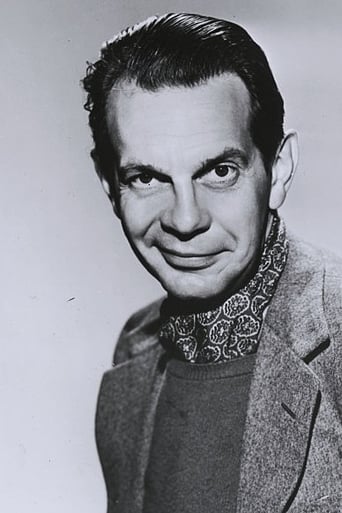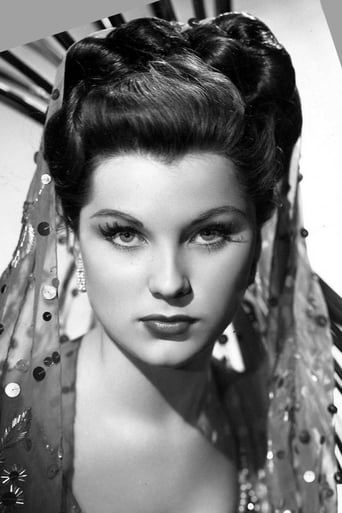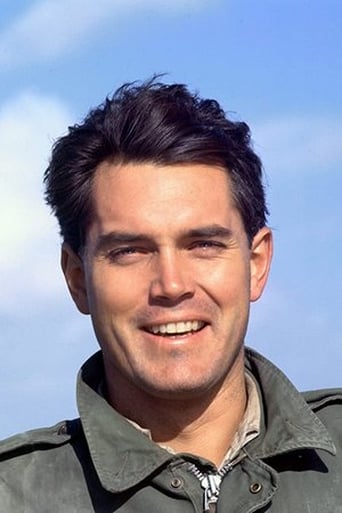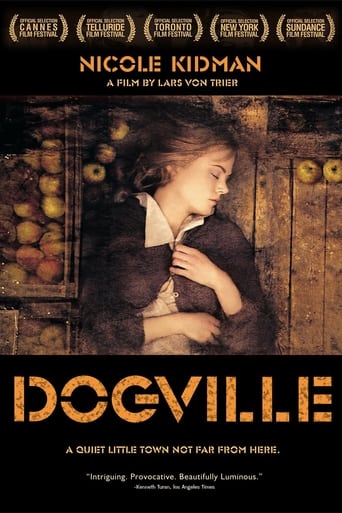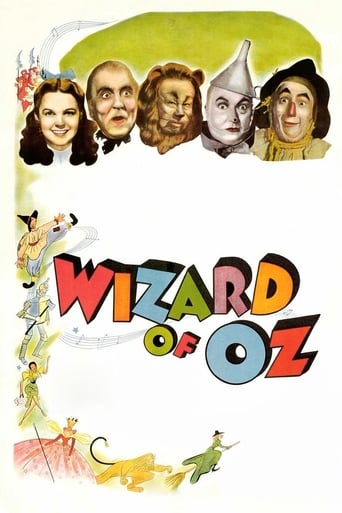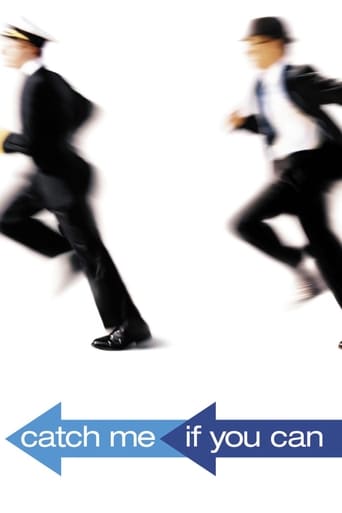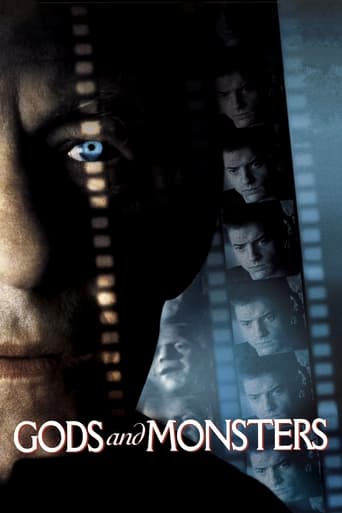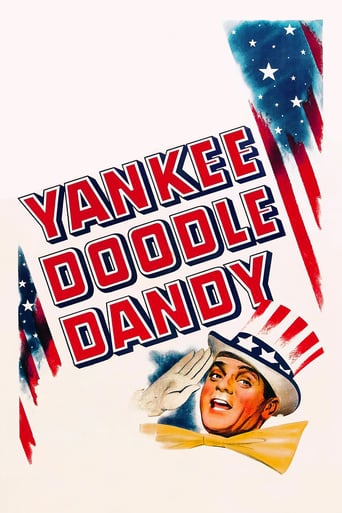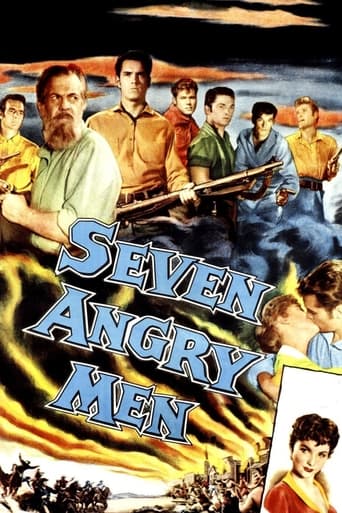
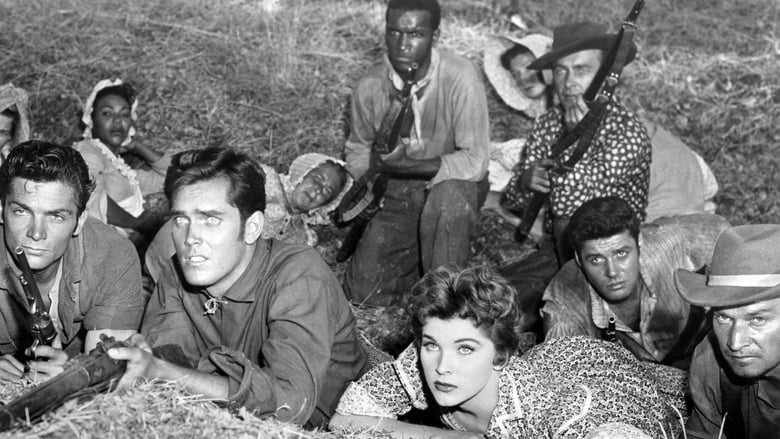
Seven Angry Men (1955)
Rise, fall and execution of John Brown, fanatic abolitionist.
Watch Trailer
Cast
Similar titles
Reviews
Very very predictable, including the post credit scene !!!
How sad is this?
A Disappointing Continuation
The film makes a home in your brain and the only cure is to see it again.
John Brown's story is certainly an interesting one and worth telling. Nobody can go against his main idea which was to free the slaves. The problem, as shown by this film was how his violence and fanaticism went against him. A lawyer at the end mentions that insanity runs in the family, but Brown makes a point of saying he is sane.The film explains his violence by showing it as a retaliation from the attack on Lawrence, Kansas. But you can say the conscience of the film is expressed by the character played by Debra Paget, who tries to hold her feelings in relation to Brown's son (Jeffrey Hunter) on account of Brown's violence. Was his desperate act at Harper's Ferry a catalyst for the civil war? The film shows it as an immediate failure, and leaves the question of its effect on the future on the air. For the story it tells this film is worth seeing, also for the story it does not tell.
"In 1856, five years before the beginning of the American Civil War, men fought and died in the Kansas Territory. Brave, violent men came from both sides of the Mason-Dixon Line and made 'Bleeding Kansas' a battleground. The prize was admission to the Union - as ether a free state or a slave state," reminds an opening scroll. Into the Kansas Territory rides bearded Raymond Massey (as John Brown) and his sons. A fierce abolitionist, Mr. Massey will go to any length to ensure Kansas obliterates slavery and enters the Union as a free state. Three years later, Massey may be at the end of his rope..."Seven Angry Men" refers to Massey's "John Brown" and his sons. There are, eventually, seven adult sons introduced. Yes, that equals eight. However, it's possible only seven are "angry" at any given time. Character development never moves the sons too far beyond looking like attractive young men who've answered an agent's casting call and tried on fake sideburns in the make-up room. The main son is handsome Jeffrey Hunter (as Owen). He receives some characterization by being the only one (oddly) to attract a steady woman. She is pretty Debra Paget (as Elizabeth Clark) from Illinois...Naturally, Ms. Paget is bothered by the family's frequently dangerous conflicts over slavery. It would have been interesting to see Paget arouse passion in some of the other sons. The next most featured son is handsome (okay, they're all handsome) Larry Pennell (as Oliver), impressive in his first screen appearance. Memorable last scenes momentarily bring Tom Irish (as Watson) and John Smith (as Frederick) to the forefront. Future TV favorites James Best (as Jason), Dennis Weaver (as John Jr.) and Guy Williams (as Salmon) are all fun to see, in early roles...Massey is fine as the biographical lead, although this mechanical story doesn't take full advantage of his impersonation. The film score, by then newcomer Carl Brandt, is noteworthy. The shadowy staging of several scenes, by director Charles Marquis Warren and photographer Ellsworth Fredericks, shows exemplary film technique.******* Seven Angry Men (3/27/55) Charles Marquis Warren ~ Raymond Massey, Jeffrey Hunter, Debra Paget, Larry Pennell
REPRISING THE ROLE of fanatical abolitionist, John Brown, Mr. Raymond Massey seemed to have ratcheted down the intensity a few notches than in his earlier effort. His previous, near classic interpretation of the role quite possibly set the bar high for any following in his trailblazing footsteps.OUR REFERENCE, OF COURSE, is to Director Michael Curtiz's SANTA FE TRAIL (Warner Brothers, 1940); in which the blood thirsty, ultra-militant abolitionist's seditious attack on Harper's Ferry, Virginia, was put down by the youthful cavalry officers Jeb Stewart (Errol Flynn) and George Armstrong Custer (none other than "Dutch" Reagan, himself), who were assisted by an army of Warner Brothers' stock company players.* TODAY'S REVIEWED FILM, which is titled SEVEN ANGRY MEN (Allied Artists, 1955)features a somewhat more sympathetic view of John Brown, "Bleeding Kansas" and the attempt to ignite a spark of armed uprising among the enslaved Negro Population in the South of the early 1860's. More tine is spent in allowing "Captain" Brown to preach,in a somewhat less fanatical manner about all how the institution of slavery is totally wrong and an evil,truly a bane to the young American Republic.THE ONLY QUESTION in contemporary life that compares would be that of Abortion. Referred to in some quarters by the euphemism of "Reproductive Rights", the controversy plagues and divides Americans in much the same manner and with equal intensity as did the two opposite camps on either side of the Mason-Dixon Line in the mid-nineteenth Century. In both instances, the answer is one of an absolute. Either owning another human being, life and death decisions over him and all of the fruits of his labor is an evil or it is not. Either human life is destroyed in abortion and in the use of embroyos' stem cells , or it is not. In either case, there is no room for compromise.THE PRODUCTION TEAM did a fine job of assembling a more than just competent cast for this feature. In addition to Raymond Massey, we have Jeffrey Hunter, Debra Paget, Dennis Weaver, Guy Williams (in pre-Disney Zorro Days), Leo Gordon and James Edwards. The cast is handily filled out by such familiar and competent players as Robert Simon, Dabbs Greer, Lane Bradford, Paul Bryar, Selmer Jackson, I. Stanford Jolley, John Lupton, Kenneth MacDonald, John Larch and Carleton Young.IN VIEWING IT for the very first time recently on the Turner Classic Movies Cable Channel, we came to the conclusion that it was meant to be a movie much in the same genre as those escapist features that were so popular in the 1930's & 40's; so ably churned out by the big studios. The Chief exponent of such production was the previously mentioned Warner Brothers. And this was no mere coincidence that Allied Artists (formerly called Monogram Pictures) was turning out this sort of retro-styled movie.THIS STUDIO,A FORMER denizen of "Poverty Row" was no doubt taking advantage of the then recent release of scores of the old films to television. There, the old movies became familiar to a whole new generation of viewers. hence, they would now be familiar with actors, characters and story lines. If the 1950's movies weren't exactly sequels or remakes, they were essentially a sort of another view of the old story.THE ELEMENTS THAT such movies were most sorely lacking were things like original musical scores from folks such as Max Steiner, the waste no time screenplays and such virtuoso Directors as Raoul Walsh and Michael Curtiz.SEVEN ANGRY MEN is worth your while in viewing; but please don't be disappointed if you find that it's not a sort of THEY DIED WITH THEIR BOOTS ON or DODGE CITY revisited.NOTE: * Off hand, the only other portrayal of Abolitionist John Brown on the screen is in Veteran Character Actor Royal Dano's essaying of the role in the James Garner, Louis Gossett & Susan Clark starring vehicle, SKIN GAME (Cherokee Productions/Warner Brothers, 1971). Can you think of any others?
Just as Raymond Massey set the Lincoln standard for essaying the role of our 16th president, he seems also to have set the standard for playing the fighting abolitionist John Brown. He did this first in Santa Fe Trail where Brown was a supporting character and again here in Seven Angry Men where Brown is the center of the story. While many of taken a run at Abe Lincoln very few have tried to do John Brown. The only other one coming to mind is Sterling Hayden. Seven Angry Men refers to John Brown and his six sons, three of whom die during the course of Brown's crusade against slavery first in Kansas and then in his raid on the Harper's Ferry Arsenal. His six sons are Tom Irish, Guy Williams, Jeffrey Hunter, Dennis Weaver, and Larry Pennell all of whom had significant careers be it before or after this film. As a subplot there is a romance going between Jeffrey Hunter and Debra Paget whose Northern sympathizing father is killed toward the beginning of the film.It will be a subject of debate among historians for years as to exactly what Brown's role was. He was a fanatic in a righteous cause, the abolition of slavery in the USA. The struggle over Kansas where Brown first appears was the opening gun of the Civil War. Four years earlier in 1850 the politicians in Washington, DC had thought they had put a damper on sectional feelings with the Compromise of 1850 which for the most part respected the line between slave and free states. But a guy named Stephen Douglas, Senator from Illinois had the brilliant idea of opening the question again to plebiscite. Our president at the time Franklin Pierce signed what was the Kansas-Nebraska Act which did just that. Settlers from the slave and free states poured in and a lot of shooting started. And that's where Brown, his sons, and his followers came in. Massey as Brown is so dominant in this film that very few others are given much of a chance. Black actors James Edwards and Joel Fluellen have some interesting roles, Edwards as a follower of Brown and Fluellen who is a free black who works as the Harper's Ferry telegrapher.The film was done by Allied Artists and it might have been better with a major studio. Major studios though weren't quite making films about such controversial subject matter in what was the beginning of the Civil Rights Era in America. Seven Angry Men is as good a film about a controversial man and his era as you will get.
